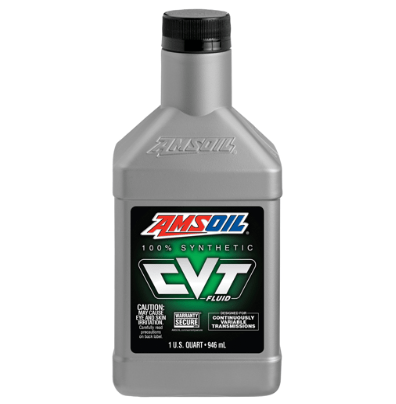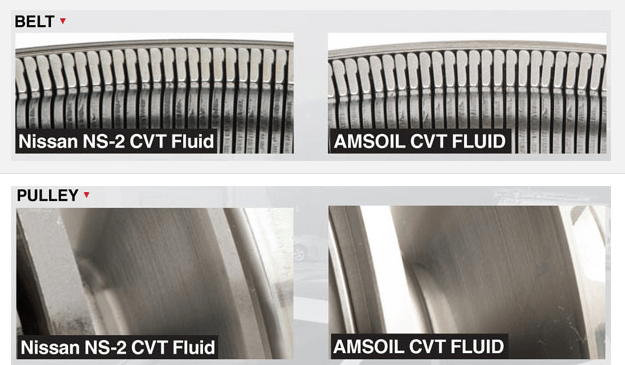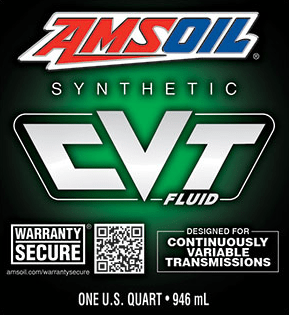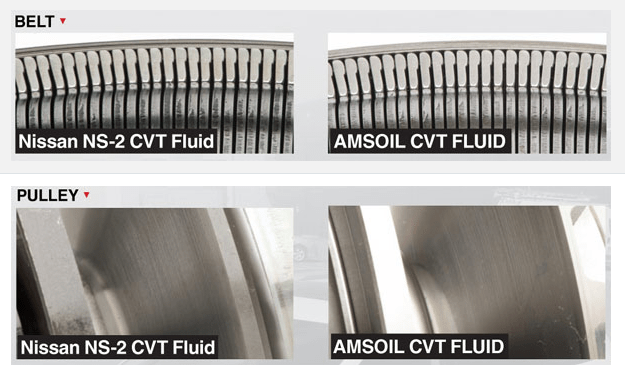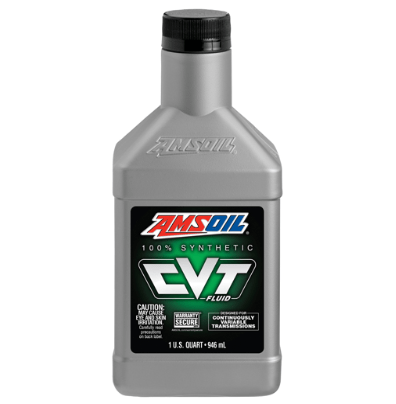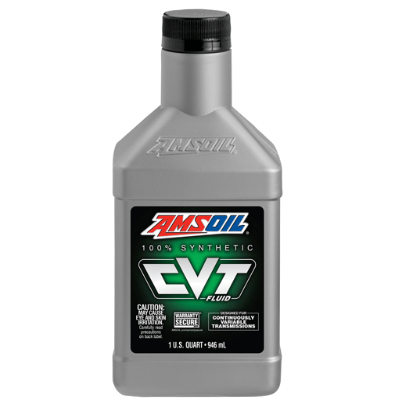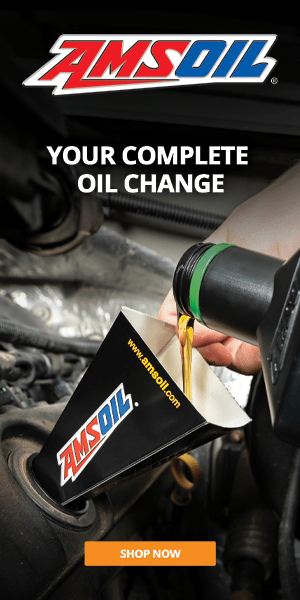How CVT Fluid for Your Nissan Can Impact Performance and Reliability
Are you aware of the impact that CVT fluid can have on the performance and longevity of your Nissan? It’s an essential element that often goes overlooked but plays a significant role in ensuring the smooth operation of your vehicle’s Continuously Variable Transmission (CVT) system. In this article, we will explore how CVT fluid affects the overall performance and lifespan of your Nissan, providing you with the knowledge to keep your vehicle in top shape.
The right CVT fluid not only lubricates crucial components but also helps regulate temperature, reduce friction, and enhance overall transmission efficiency. Neglecting regular fluid changes or using the wrong type can lead to accelerated wear and tear, diminished performance, and costly repairs.
At AMSOIL, we understand the importance of maintaining your Nissan’s CVT system. Our commitment to
providing high-quality fluids ensures you can enjoy reliable and long-lasting performance. Join us as we delve deeper into understanding how CVT fluid impacts your Nissan, empowering you with the information needed to make informed decisions about your vehicle’s maintenance and care.
Understanding CVT fluid and its role in your Nissan’s performance
To comprehend the impact of CVT fluid on your Nissan’s performance, it’s crucial to first understand what CVT fluid is and how it functions within the transmission system. CVT fluid, also known as Continuously Variable Transmission fluid, is a specialized lubricant designed to meet the unique requirements of CVT systems.
Unlike traditional automatic transmissions, which use a fixed number of gears, CVT systems operate on a pulley and belt system that provides an infinite number of gear ratios. This design offers several benefits, including smoother acceleration, improved fuel efficiency, and enhanced driving comfort. However, it also places increased demands on the transmission fluid.
CVT fluid serves multiple purposes within the transmission system. Firstly, it acts as a lubricant, ensuring that the various moving parts within the CVT system operate smoothly and without excessive friction. Additionally, it works as a coolant, dissipating heat generated by the transmission during operation. Finally, CVT fluid helps maintain the correct hydraulic pressure within the system, allowing for seamless gear ratio transitions.
The importance of proper CVT fluid maintenance
Maintaining the proper level and quality of CVT fluid is crucial to the overall health and performance of your Nissan’s transmission system. Regular fluid changes and inspections are vital to prevent premature wear and maintain optimal performance. Neglecting CVT fluid maintenance can lead to a range of issues, including reduced fuel efficiency, diminished acceleration, and even transmission failure.
It’s essential to follow the manufacturer’s recommended maintenance schedule for CVT fluid changes. While the interval may vary depending on the model and driving conditions, it’s generally recommended to have the CVT fluid inspected and potentially changed every 30,000 to 60,000 miles. However, it’s important to note that severe driving conditions, such as towing heavy loads or frequent stop-and-go traffic, may require more frequent fluid changes.
Regular inspections of the CVT fluid can also help identify potential issues before they escalate into major problems. If you notice any signs of fluid discoloration, contamination, or a burnt smell, it’s crucial to have the fluid inspected and potentially changed by a qualified technician. Ignoring these warning signs can lead to irreversible damage to your Nissan’s transmission system.
Signs that your CVT fluid may need to be changed
While following the manufacturer’s recommended maintenance schedule is essential, there are also specific signs to watch out for that may indicate the need for an immediate CVT fluid change. Being aware of these signs can help you address potential issues promptly and avoid more significant problems down the line.
One of the most obvious signs that your CVT fluid may need to be changed is a noticeable decline in
performance. If you experience sluggish acceleration, delayed gear shifts, or a lack of power, it could be an indication of degraded CVT fluid. Additionally, if you notice a whining or grinding noise coming from the transmission, it’s essential to have the fluid checked, as it could be a sign of excessive wear or contamination.
Another sign to watch out for is a noticeable increase in transmission temperature. If you regularly observe your Nissan’s temperature gauge rising above normal levels, it could be an indication of inadequate cooling due to degraded CVT fluid. Overheating can cause severe damage to the transmission and other components, leading to costly repairs.
Additionally, if you notice fluid leaks beneath your vehicle, it’s crucial to have them inspected immediately. CVT fluid leaks can occur due to worn seals or gaskets, and they can lead to a loss of fluid and subsequent transmission damage if left unaddressed. If you notice any fluid leaks, it’s best to have a qualified technician diagnose and repair the issue promptly.
The impact of old or contaminated CVT fluid on your Nissan’s performance
Using old or contaminated CVT fluid can have a detrimental effect on your Nissan’s performance and longevity. Over time, CVT fluid naturally degrades due to the harsh operating conditions within the transmission system. It can become contaminated with metal shavings, dirt, and other debris, resulting in reduced lubrication and compromised performance.
Old or contaminated CVT fluid can lead to increased friction within the transmission system, causing excessive wear on the pulley and belt components. This wear can result in a loss of power, decreased fuel efficiency, and a higher risk of transmission failure. Additionally, the presence of contaminants in the fluid can lead to clogged filters and valves, further impairing the transmission’s ability to function properly.
Regularly changing the CVT fluid according to the manufacturer’s recommendations helps ensure that your Nissan’s transmission system remains in optimal condition. Fresh fluid provides proper lubrication, cooling, and hydraulic pressure regulation, allowing for smooth gear transitions and reliable performance. By taking proactive steps to maintain the cleanliness and quality of your CVT fluid, you can extend the lifespan of your Nissan’s transmission and avoid costly repairs.
How CVT fluid affects the longevity of your Nissan’s transmission
The lifespan of your Nissan’s transmission is directly influenced by the quality and condition of the CVT fluid. Using high-quality fluid that meets the manufacturer’s specifications is essential to ensure the longevity of your transmission system. Conversely, neglecting fluid changes or using subpar fluids can significantly reduce the lifespan of your transmission and lead to premature failure.
CVT fluid serves as a protective barrier between the various metal components within the transmission system. It lubricates these components, reducing friction and wear during operation. Over time, the fluid gradually breaks down due to heat, oxidation, and contamination. This breakdown can result in reduced viscosity, diminished lubrication properties, and compromised performance.
Regular fluid changes help remove old, degraded fluid and replace it with fresh fluid that provides optimal lubrication and cooling. By maintaining the correct viscosity and lubricating properties, the new fluid helps minimize wear on the transmission components and extends their lifespan. It also helps prevent the buildup of harmful deposits or contaminants that can lead to transmission damage.
In addition to regular fluid changes, using high-quality CVT fluid specifically designed for your Nissan model is crucial. OEM (Original Equipment Manufacturer) fluids are formulated to meet the unique requirements of your vehicle’s transmission system, ensuring optimal performance and longevity. Using aftermarket or generic fluids may not provide the same level of protection and can potentially harm your transmission.
The benefits of using high-quality CVT fluid in your Nissan
Using high-quality CVT fluid specifically designed for your Nissan model offers several benefits. These fluids are formulated to meet the unique requirements of your vehicle’s transmission system, providing enhanced performance, longevity, and reliability.
One of the primary benefits of using high-quality CVT fluid is improved lubrication. The right fluid ensures that all the moving parts within the transmission system operate smoothly and without excessive friction. This minimizes wear and tear on the pulley and belt components, extending their lifespan and reducing the risk of premature failure.
High-quality CVT fluid also helps regulate temperature within the transmission system. It effectively dissipates heat generated during operation, preventing overheating and subsequent damage to the transmission. By maintaining optimal operating temperatures, the fluid ensures consistent performance and protects against costly repairs.
Additionally, using OEM fluids provides peace of mind. These fluids undergo rigorous testing and meet the manufacturer’s specifications, ensuring compatibility and performance. By using fluids recommended by the manufacturer, you can be confident that you are providing the best care for your Nissan’s transmission system.
Common myths and misconceptions about CVT fluid
There are several misconceptions surrounding CVT fluid, leading to confusion among vehicle owners. Let’s debunk some of the common myths and clarify the facts surrounding CVT fluid.
Myth 1: CVT fluid is a lifetime fluid and never needs to be changed.
Contrary to popular belief, CVT fluid is not a lifetime fluid and does require periodic changes. While CVT
systems are designed to be more efficient and require less maintenance than traditional automatic transmissions, the fluid still degrades over time and needs to be replaced.
Myth 2: Any transmission fluid can be used in a CVT system.
Using the wrong type of fluid in a CVT system can have severe consequences. CVT fluids are specifically formulated to meet the unique requirements of CVT systems, and using the wrong type can lead to poor performance, increased wear, and potential transmission failure. It’s crucial to use the fluid recommended by the vehicle manufacturer.
Myth 3: Changing CVT fluid is a complicated and expensive process.
While changing CVT fluid requires specific tools and expertise, it is not an overly complicated or expensive process when performed by a qualified technician. Regular fluid changes are a small investment compared to the potential costs of transmission repairs or replacement.
Myth 4: Using additives can improve CVT fluid performance.
CVT fluid is engineered to perform optimally without the need for additives. In fact, using additives not recommended by the manufacturer can potentially harm the transmission system. It’s best to rely on
high-quality CVT fluid and follow the manufacturer’s recommendations for maintenance. By dispelling these myths and understanding the facts about CVT fluid, you can make informed decisions about
maintaining your Nissan’s transmission system.
How to properly check and top up CVT fluid in your Nissan
Regularly checking and topping up CVT fluid is an important aspect of maintenance for your Nissan’s transmission system. While it’s best to consult your vehicle’s owner’s manual for specific instructions, here are general steps to help you perform this task correctly.
- Park your vehicle on a level surface and engage the parking brake.
- Start the engine and let it warm up to operating temperature. This ensures that the CVT fluid is at the correct temperature for an accurate reading.
- Locate the CVT fluid dipstick. It is typically labeled and can be found near the transmission, usually towards the front of the engine bay.
- With the engine running, carefully remove the dipstick and wipe it clean with a lint-free cloth.
- Reinsert the dipstick fully, then remove it again to check the fluid level. Ensure that the fluid reaches the “FULL” mark on the dipstick. If the level is below the mark, you will need to add fluid.
- To add CVT fluid, use a funnel to avoid spills. Slowly pour the fluid into the transmission through the dipstick tube.
- Check the fluid level again to ensure it is at the correct level. Repeat the process if necessary, until the level reaches the “FULL” mark.
- Once you have finished topping up the fluid, securely reinsert the dipstick and ensure it is properly seated. Remember, it’s crucial to use the recommended CVT fluid specified by the manufacturer when topping up or changing the fluid. If you are unsure or uncomfortable performing this task yourself, it’s best to consult a qualified technician.
Recommended CVT fluid change intervals for Nissan vehicles
While the specific CVT fluid change intervals may vary depending on the model and driving conditions, Nissan provides general guidelines to help you maintain your vehicle’s transmission system. It’s important to consult your vehicle’s owner’s manual for the manufacturer’s recommendations that apply to your particular Nissan model.
For most Nissan vehicles equipped with a CVT, the manufacturer typically recommends having the CVT fluid inspected and potentially changed every 15,000 to 30,000 miles. However, it’s important to note that severe driving conditions, such as towing heavy loads or frequent stop-and-go traffic, may require more frequent fluid changes.
Following the manufacturer’s recommendations for CVT fluid changes helps ensure optimal performance,
longevity, and reliability of your Nissan’s transmission system. By staying proactive and adhering to the
maintenance schedule, you can enjoy a smoother driving experience and avoid costly repairs.
CVT fluid plays a critical role in the performance and longevity of your Nissan’s transmission system. By
understanding its importance and following the manufacturer’s recommendations for maintenance, you can ensure optimal performance, extend the lifespan of your transmission, and avoid costly repairs.
Regular fluid changes, using high-quality CVT fluid, and proper maintenance are key to keeping your Nissan in top shape. At AMSOIL, we are committed to providing high-quality fluids and empowering our customers with the knowledge they need to make informed decisions about their vehicle’s maintenance and care.
Remember, neglecting CVT fluid maintenance or using the wrong type can lead to diminished performance, increased wear, and potentially costly repairs. Take control of your Nissan’s performance and longevity by prioritizing CVT fluid maintenance and ensuring you use the right fluid for your vehicle. Your Nissan will thank you for it with smooth, reliable, and long-lasting performance.
AMSOIL is the Best CVT Fluid for Your Nissan Vehicle
AMSOIL Synthetic CVT Fluid is the ultimate solution to unleash the full potential of your Nissan vehicle. Designed specifically for Continuously Variable Transmissions, this high-performance fluid ensures unparalleled protection and optimal performance. Picture yourself effortlessly gliding down the highway, with smooth gear transitions and improved fuel efficiency. With AMSOIL Synthetic CVT Fluid flowing through your transmission, you can say goodbye to jerky shifts and hello to a luxurious driving experience like no other.
Not only does AMSOIL Synthetic CVT Fluid improve overall performance, but it also enhances durability and extends the life of your transmission system. This advanced formula boasts exceptional thermal stability, reducing temperature-related issues that often plague CVTs under heavy loads or during prolonged use. Engineered with precision-engineered additives, it effectively prevents slippage, wear, and corrosion- keeping your transmission running at its peak for years to come.
In addition to its outstanding protective qualities, AMSOIL Synthetic CVT Fluid offers unrivaled versatility in extreme conditions. Whether you’re battling frigid temperatures or scorching heatwaves, this fluid retains its viscosity properties throughout a wide range of temperatures – ensuring flawless operation regardless of weather conditions.

